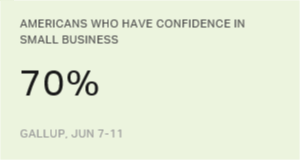PRINCETON, NJ -- Sixty percent of Americans believe Toyota's vehicles are safe, and 61% say they have not lost confidence in the automaker despite the safety issues that have resulted in large-scale recalls of Toyota vehicles.
Current Toyota owners are even more positive about the company's cars -- 74% say they have not lost confidence in Toyota vehicles and 82% think they are safe to ride in.
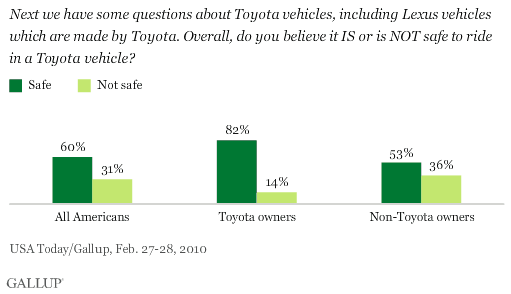
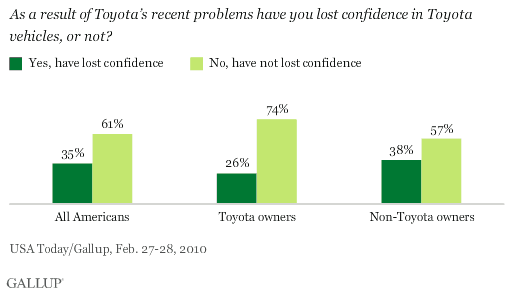
"Though most Americans remain confident in Toyota vehicles, they are less charitable in their views of the way the company has handled the matter."
These results are based on a new USA Today/���۴�ýpoll, conducted Feb. 27-28, as Toyota confronts safety issues affecting some of its vehicles, most notably for unexpected acceleration. The company issued recalls for many of its models to address the problem, which has been attributed to the vehicles' floor mats and to sticky gas pedals. Toyota executives -- including company President Akio Toyoda -- testified at congressional hearings regarding safety and company practices last week.
Toyota's share of the U.S. auto market has already suffered because of the safety issues. The poll attempted to assess the longer-term impact of the recall by asking those who plan to buy or lease a car within the next three years whether they would consider Toyota vehicles. In all, 17% of prospective car buyers say they will no longer consider Toyotas because of the recalls. But three times as many likely car buyers, 53%, say they would still consider buying or leasing a Toyota, suggesting that there remains a potentially large market for Toyotas in the United States. Twenty-nine percent of likely U.S. car buyers say they would not have considered a Toyota even before the recalls.
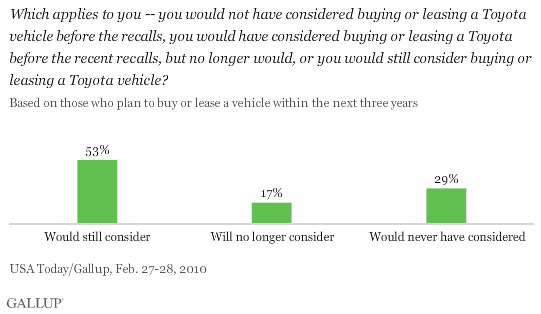
Among current Toyota owners who are likely to buy or lease a car in the near future, 11% say they no longer will consider buying or leasing a Toyota because of the recent recalls; 79% still would.
This high degree of Toyota loyalty may stem in part from the fact that relatively few Toyota owners claim to be affected by the recalls. Just 14% say their vehicle appeared on the recall list for gas pedal problems, while 70% say their car was not on the list, and 16% are unsure.
Most Say Toyota's Response Too Slow
Though most Americans remain confident in Toyota vehicles, they are less charitable in their views of the way the company has handled the matter. A majority, 55%, say Toyota Motor Corporation did not move quickly enough to respond to safety issues with its vehicles. Most of the rest, 32%, say the response has been about right. Toyota owners and non-owners have similar views on the question.
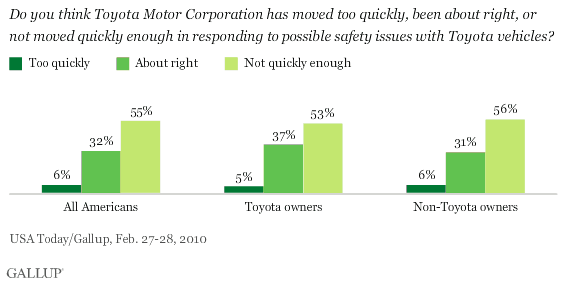
The U.S. government gets slightly better reviews for its response -- 42% say it did not move quickly enough to respond to Toyota safety issues, only slightly more than the 37% who say the government's response has been about right. Toyota owners and non-owners rate the government's response about the same.
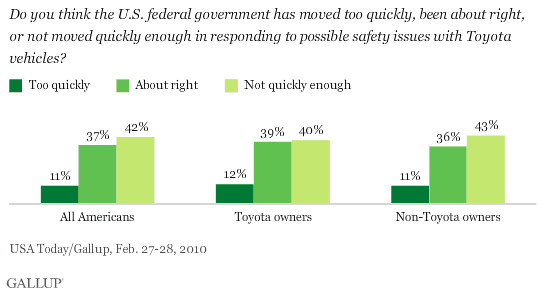
Americans paying close attention to the news about Toyota vehicles are more critical of both Toyota and the U.S. government. Among the 26% of Americans who are following the news about Toyota recalls "very closely," 66% say Toyota and 52% say the U.S. government did not respond fast enough.
Bottom Line
The safety concerns surrounding Toyota vehicles are surely not welcome news for the automaker. While Americans are generally critical of the company's response to the matter, most believe the company's vehicles are safe and say their confidence in the automaker has not been affected. Toyota's sales likely will continue to suffer, but most Americans in the car-buying or leasing market -- and about three-quarters of those who would have considered a Toyota before the recent recalls -- say they will still consider buying or leasing a Toyota vehicle.
Survey Methods
Results are based on telephone interviews with a random sample of 2,021 national adults, aged 18 and older, conducted Feb. 27-28, 2010. For results based on the total sample of national adults, one can say with 95% confidence that the maximum margin of sampling error is ±3 percentage points.
For results based on the sample of 495 adults whose household owns or leases a Toyota or Lexus vehicle, the maximum margin of sampling error is ±5 percentage points.
For results based on the sample of 990 adults whose plan to buy or lease a vehicle within the next three years, the maximum margin of sampling error is ±4 percentage points.
Interviews are conducted with respondents on land-line telephones and cellular phones.
In addition to sampling error, question wording and practical difficulties in conducting surveys can introduce error or bias into the findings of public opinion polls.
